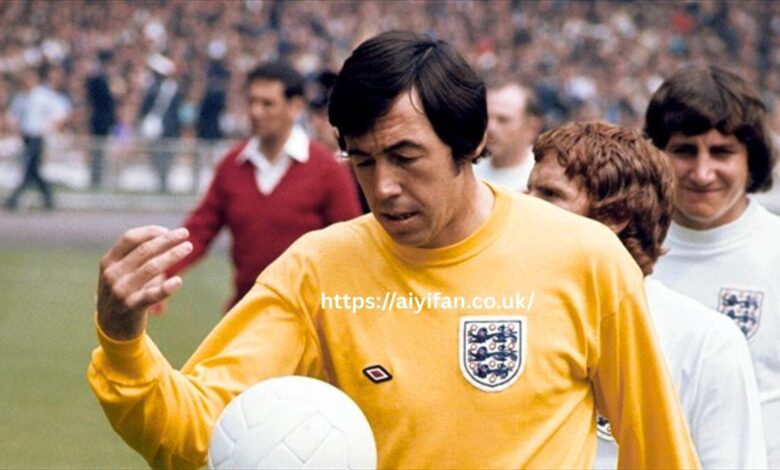Gordon Banks The Legendary Save That Shook the World

When people talk about the greatest goalkeepers in football history, one name always rises to the surface Gordon Banks Known for his calm presence, sharp reflexes, and extraordinary consistency, Banks cemented his legacy not just through trophies and accolades, but with one unforgettable moment that is still replayed and discussed over 50 years later. That moment, often called “The Save of the Century,” came during the 1970 World Cup when he denied Pelé a man many consider the greatest forward of all time in a breathtaking sequence that stunned the world.
This wasn’t just a save. It was an act of athletic genius that blended anticipation, technique, and heart. To truly understand why this moment is still celebrated, we need to look at Gordon Banks career, the context of that iconic World Cup, and the lasting legacy of that one miraculous stop.
Early Life and Career of Gordon Banks
Gordon Banks was born on 30 December 1937 in Sheffield, England. Like many working-class boys in post-war Britain, his love for football began on the streets. He started his professional career with Chesterfield, but it was at Leicester City where his goalkeeping brilliance began to shine. With his commanding presence between the posts, Banks quickly gained recognition as one of England’s most promising keepers.
His performances at Leicester earned him a transfer to Stoke City in 1967, where he would continue to build his reputation as a reliable shot-stopper. Unlike some keepers known for showmanship, Banks was defined by his discipline, positioning, and incredible reflexes.
Banks and England’s 1966 World Cup Triumph
Before the legendary save in 1970, Gordon Banks was already a national hero. He was England’s first-choice goalkeeper during the 1966 World Cup, where he kept clean sheets against Uruguay, Mexico, France, and Argentina, playing a crucial role in England’s path to the final.
In the final against West Germany, Banks conceded two goals but stood firm when it mattered most. England went on to win 4-2 in extra time, giving the nation its first (and only) World Cup trophy. For his efforts, Banks was celebrated as one of the world’s best goalkeepers, though even he didn’t know that his most iconic moment was still to come.
The Setting 1970 World Cup in Mexico
The stage was the 1970 FIFA World Cup in Mexico a tournament regarded by many as one of the greatest ever, with legendary names like Pelé, Jairzinho, Rivellino, Bobby Moore, and Franz Beckenbauer lighting up the competition.
England, the defending champions, were placed in the same group as Brazil, the favorites who were hungry to reclaim the crown. When the two giants met in Guadalajara on June 7, 1970, it was billed as a clash between the best attack in the world and the best defense.
The Brazilian team featured Pelé, already a global superstar, alongside rising talents like Jairzinho and Tostão. England, on the other hand, relied on the defensive brilliance of Bobby Moore and the steady hands of Gordon Banks.
The Legendary Save Against Pelé
The moment arrived in the 10th minute of the game. Brazil launched a quick attack, with Jairzinho racing down the right wing. He whipped in a powerful, looping cross toward Pelé, who had perfectly timed his run into the box.
Pelé rose majestically above England’s defenders and powered a header downwards exactly as strikers are taught to do sending the ball bouncing toward the bottom corner of the net. For a split second, it looked like a certain goal. Pelé himself later admitted, “I already shouted ‘Goal!’”
But Gordon Banks had other ideas.
With lightning reflexes, Banks dived to his right, stretched out his arm, and with a flick of his wrist, managed to scoop the ball up and over the crossbar. The combination of speed, anticipation, and technique was so extraordinary that even Pelé stood in disbelief, later calling it the greatest save he had ever seen.
Reaction from Players and Fans
After the save, the expressions told the story. Pelé, who rarely looked surprised on a football pitch, smiled in admiration. He later said:
“I scored so many goals in my career, but people always talk about that save. It was the greatest save I’ve ever seen.”
England captain Bobby Moore also described the save as unbelievable, and fans around the world, watching on black-and-white televisions, gasped at the sheer improbability of what they had witnessed.
Commentators labeled it “The Save of the Century,” and decades later, it remains one of the most replayed clips in football history.
Why Was It So Special?
What made the save legendary wasn’t just the physical feat it was the combination of factors that made it seem almost impossible:
- Pelé’s Header – It was perfectly executed: downward, powerful, and placed in the corner. Ninety-nine times out of a hundred, it would have been a goal.
- Banks’ Anticipation – Banks had positioned himself ideally, reading the cross and Pelé’s body movement before the ball was struck.
- Reflexes and Technique – Diving at full stretch, he managed not only to reach the ball but to deflect it over the bar instead of into his own net.
- Context – This wasn’t just any match; it was the reigning champions against the most feared attacking side in football, on the biggest stage of all.
The Aftermath of the Game
Despite Banks’ heroics, Brazil won the match 1-0 thanks to a goal from Jairzinho. Brazil would go on to lift the 1970 World Cup, widely regarded as one of the greatest teams ever assembled.
For England, the tournament ended in heartbreak after losing to West Germany in the quarterfinals. Yet, for Gordon Banks, his reputation only grew stronger. Even in defeat, his save against Pelé became the defining moment of the tournament for England fans.
Gordon Banks’ Later Career and Life
Tragically, Banks’ career was cut short in 1972 when a car accident damaged his right eye, leaving him partially blind. Despite the setback, he briefly continued playing in the United States for the Fort Lauderdale Strikers, where he still displayed flashes of his brilliance.
Off the pitch, Banks lived a humble life. He worked as a coach, did community outreach, and remained deeply loved by fans. He passed away in February 2019, but his name continues to echo whenever discussions of goalkeeping greatness arise.

Legacy of The Save of the Century
The reason the save has endured is simple it transcends football. It represents the idea that even against the greatest odds, with skill and determination, the impossible can be achieved.
For goalkeepers, it became the gold standard of reflex saves. For fans, it became a reminder of why we fall in love with sport in the first place the unpredictability, the drama, and the moments that stay with us forever.
Today, whenever lists of the greatest saves in football history are compiled, Gordon Banks’ stop against Pelé almost always sits at number one. And it’s not just nostalgia modern analysts who break down the footage continue to marvel at the physics-defying effort.
Conclusion
Gordon Banks’ save against Pelé in the 1970 World Cup wasn’t just a remarkable moment in football it became a piece of sporting folklore. It symbolized the beauty of the game: one of the greatest strikers delivering a perfect header, and one of the greatest goalkeepers responding with an even greater save.
More than half a century later, fans still talk about it, share clips of it, and feel the same awe as those who saw it live. Gordon Banks may have won the 1966 World Cup, but it was this single save that immortalized him forever.





